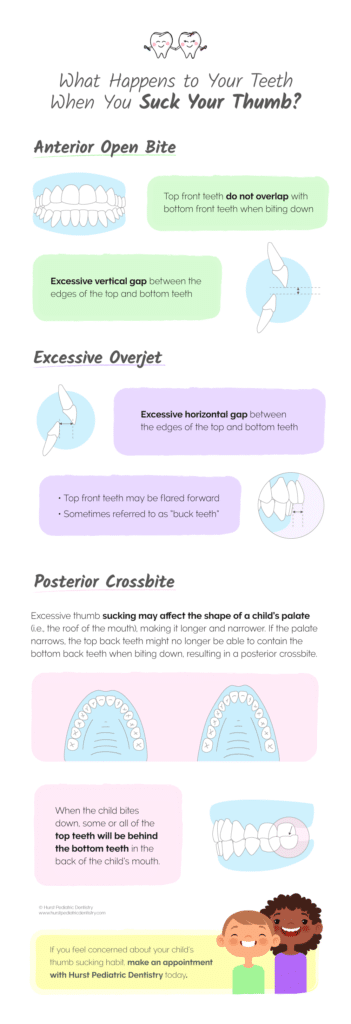Thumb Sucking & The Effects on Your Teeth

Sucking on a thumb or finger is a natural way for infants to comfort themselves. But will it harm your child’s teeth?
In this article, we will address the following questions:
- Will thumb sucking affect your teeth?
- At what age might thumb sucking cause a dental problem?
- What happens to your teeth when you suck your thumb?
- How do you break a thumb sucking habit?
Will Thumb Sucking Affect Your Teeth?
It might. A long-term sucking habit can eventually lead to crooked teeth and bite problems, meaning that your child may end up needing orthodontic treatments that he or she would not have otherwise needed. Fortunately, finger and thumb sucking habits generally only become an issue if they continue for years. Most children outgrow these habits before they cause any lasting dental problems.
At What Age Might Thumb Sucking Cause a Dental Problem?
The longer a thumb sucking habit lasts, the more likely it is that a child will develop dental problems. However, there is no one magical age before which thumb sucking is okay and after which it will cause dental problems. This is, in part, because the length of the thumb sucking habit is only one of numerous factors that determine whether a child’s thumb sucking habit will lead to crooked teeth. (Some of the other factors include the natural shape and spacing of the child’s teeth, how frequently the child sucks his or her thumb, how forcefully the child sucks on his or her thumb, and location/placement of the thumb in the child’s mouth.)
Some research suggests that children who continue sucking their finger or thumb until they are 5 or older are significantly more likely to have bite issues than children who kick their sucking habit before age 5. However, that same study also indicates that thumb and finger sucking are associated with bite problems even before age 5 (as do many other studies).
The American Dental Association recommends that parents discourage thumb sucking in children over the age of 4, while the American Academy of Pediatric Dentistry suggests that intervention may be appropriate when a child continues sucking his or her thumb past the age of 3.
What Happens to Your Teeth When You Suck Your Thumb?
The exact ways in which a prolonged thumb sucking habit will affect a child’s teeth depend on numerous factors, including the positioning of the thumb inside the child’s mouth. As a result, thumb sucking has been associated with a variety of different types of bite problems. That said, some of the bite problems most commonly associated with thumb sucking include anterior open bites, posterior crossbites, and excessive overjets, each of which is described below:
- Anterior Open Bite. When a child with an anterior open bite bites down, the child’s top teeth will not overlap with his or her bottom teeth in the front. That is, there will be a vertical gap between the top and bottom front teeth.
- Excessive Overjet. The word “overjet” refers to how far the top teeth protrude in front of the bottom teeth. In a child with an excessive overjet, there will be an unusually large horizontal distance between the top and bottom front teeth. This type of bite problem is sometimes referred to as “buck teeth”.
- Posterior Crossbite. When teeth are perfectly aligned, a child’s top teeth overhang the bottom teeth slightly. This means that, when a child with perfectly aligned teeth bites down, you won’t be able to see the top edges of the child’s bottom teeth because they will be covered by the child’s top teeth. In contrast, when a child with a posterior crossbite bites down, it will be some of the child’s top teeth that are partially obstructed from view. More specifically, some or all of the top teeth in the back of the child’s mouth will be behind the bottom teeth when biting down.

How Do You Break a Thumb Sucking Habit?
First and foremost, we recommend against punishing children for sucking their thumbs. Children often suck their fingers or thumbs to comfort themselves when they feel upset or stressed. Acting angry or frustrated when your child sucks his or her thumb may actually make the habit worse.
In our experience, children are most likely to successfully break a thumb sucking habit when the children themselves want to break it. If you are concerned that your child is too old for thumb sucking but does not feel motivated to stop, we recommend looking for positive, encouraging ways to motivate them. For example, you might talk to your child about how, now that your child is getting to be such a big boy/girl, he/she gets to help take care of his/her teeth by helping to brush and floss them and by not sucking on his/her thumb. Try to avoid shaming your child; as mentioned above, upsetting your child may make the habit worse.
If you need help discussing the issue with your child, talk to your child’s dentist. A pediatric dentist can help encourage your child to want to stop sucking his or her thumb using supportive and age-appropriate language.
Once your child feels motivated to stop, the process of breaking the habit should become significantly easier. At this point, it may help to assist your child with identifying triggers and coming up with alternative ways to respond. For example, if your child mostly sucks his or her thumb at bedtime when trying to fall asleep, your child might decide he or she can get the comfort needed to fall asleep by snuggling with a new stuffed animal or by listening to soothing music. If your child often sucks on his or her thumb when feeling stressed or overwhelmed, you may be able to work out a plan to help remove some of the stressors. Alternatively, you may be able to teach your child how to cope with stressors through methods like practicing mindfulness instead of through thumb sucking.
Pediatric Dentistry in Hurst, Texas
If you feel concerned about your child’s thumb sucking habit, make an appointment to see us. Hurst Pediatric Dentistry’s Dr. Lin is a board-certified pediatric dentist who has lots of experience working with children to break finger and thumb sucking habits.
Hurst Pediatric Dentistry is located in Hurst, Texas, and serves children from Hurst, Euless, Bedford, North Richland Hills, Colleyville, Irving, Arlington and the surrounding areas.
This article is intended to provide general information about oral health topics. It should not be used to diagnose or treat any medical condition or as a substitute for the advice of a healthcare professional who is fully aware of and familiar with the specifics of your case. Always seek the advice of your dentist or other qualified healthcare provider with regard to any questions you may have relating to a medical condition or treatment.
MEDICALLY REVIEWED BY:
Dr. Jin Lin

Dr. Jin Lin is a board-certified pediatric dentist with a passion for helping children achieve healthier, more beautiful smiles. He earned his Bachelor of Science degree from Cornell University and his Doctor of Dental Medicine (D.M.D.) degree from the Harvard School of Dental Medicine. After graduating cum laude from dental school, he completed his post-doctoral pediatric dentistry training at Boston Children’s Hospital and the Harvard School of Dental Medicine, where he served as chief resident and worked with children with a wide variety of special medical and dental needs, including children with rare syndromes.

